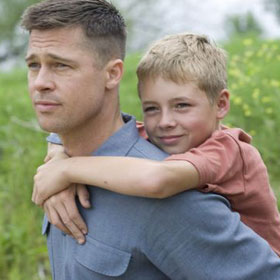The Tree Of Life

2.5/5
In The Tree of Life, legendary director/writer Terrence Malick attempts to evaluate a fundamental conflict: in a rather heavy-handed monologue that opens the film, the muted matriarch Mrs. O’Brien (played by the gorgeous Jessica Chastain) says we are brought through life either “by nature” or “by grace.” “You have to choose which one you will follow,” she croons. The nature/grace conflict ends up being rather trite and uninspired. Nature is predominately represented by Brad Pitt’s stern Mr. O’Brien who has strict rules of propriety for his children, but also sometimes by small dinosaurs who can bully around slightly smaller dinosaurs. Grace is portrayed by Chastian, who frolics in the fields with her children, as well as things like blooming flowers and water.
Although Malick’s musings on nature and grace fall flat, the failure makes way for a much more fascinating and meta conflict to arise: never before has the line between ambition and self-indulgence been so blurry. Malick’s film “centers” (to the extent the word can be used in reference to The Tree of Life) around an attractive family in the 1950s: domineering Mr. O’Brien and sweet, silent Mrs. O’Brien live with their three adorable boys in a quiet Texas town. Malick captures the quiet, gritty moments which make up our lives in quick cuts and quiet vignettes. When the characters do speak, it never quite feels like dialogue; it feels somewhere in between Biblical verse and transient whisper. When Mr. O’Brien tells his son to “only speak when [he] has something important to say,” he serves as a stand-in for Malick speaking to his characters. When Mr. O’Brien lashes out at his son’s rebellion, it is an anger that is frankly directorial.
The rather straight-forward story of the O’Briens, however, is mixed in with an extended depiction of…well…the creation of the universe. The audience watches in confusion as Malick shows us pulsating blood veins, the inside of a cell, a tree on a perch, planets, dinosaurs, water creatures, meteors and grass for a truly experimental half hour. As if this weren’t enough, Malick layers on two additional timelines: in one, Sean Penn plays Pitt’s eldest son in modern times, in the other, all the characters unite in a sort of purgatory on the beach.
The Tree of Life, which has taken years and years to make, has already proven to be one of the most divisive films of the year, if not decade. It won the Palme d’Or at this year’s Cannes Film Festival and a rave review from A.O. Scott, but also has been criticized as boring, pretentious crap by bloggers and critics alike. The direction of the review generally aligns with whether the reviewer believes the directorial choices were ambitious and brilliant or self-indulgent and meaningless, and for a film about the very creation of the universe, perhaps this question was part of Malick’s intention.
Few could argue that every aspect of the film are successful. When you watch Chastain, beams of sunlight highlighting her auburn curls, pet a butterfly while a brown cat lazily walks behind her, it’s hard not to roll your eyes at the implication that anyone would be moved or enraptured by such a treacly, cloying moment. In fact, much of Malick’s more Planet Earth-y moments feel more like a screensaver fit for a hi-def MacBook Pro screen than anything worth devoting much thought to.
Similarly, Penn’s entire timeline falls flat. The metallic cinematography makes a tired point about modernity, and Penn’s furrowed brow and loose tie add little emotional resonance to the O’Briens’ storyline. At the end, when you watch Penn share meaningful glances with the 1950’s version of his family, there’s a narrative disconnect and an emotional void.
While one must respect the film’s ambition, The Tree of Life is at its best at its most grounded moments. The middle hour, which linearly depicts ten or so years in the life of the O’Briens (starting with the birth of their eldest son), is captivating and resonant. Malick captures humanity at its most elemental: a baby taking his first steps, brothers running on a dirt field, a mother and father presiding over a dinner table. In the aggregate, the moments coalesce into a vibrant and complete portrait of a family, as Jack, the eldest son (and the film’s indisputable protagonist), develops from a state of Innocence to Anger, in their most undiluted forms.
While it feels easy and simple-minded to disregard Malick’s over-the-top ambitions, they do detract from the impact of the O’Briens’ storyline. When confronted with 30 minutes on the creation of the universe, a storyline about the effect a father — who is mean, but not without redeeming features — has on his eldest son can feel a bit small. The Tree of Life is a film that begs for an extreme reaction: brilliant or horrific, moving or boring, ambitious or self-indulgent. But perhaps the most reasoned (although less tweetable) response is somewhere in between: the film is beautiful and utterly one-of-a-kind; some things work, some really do not, but in the end, even if you hate it, isn’t it refreshing to see a film that attempts to accomplish so much? And isn’t there something inspiring and beautiful about the idea that we live in a universe where The Tree of Life and The Hangover: Part II can be released in the same week?
2 Comments
Leave a comment
RELATED ARTICLES
Get the most-revealing celebrity conversations with the uInterview podcast!





I had really high expectations for this film, especially given the stunningly beautiful trailer, which itself is probably better than most films out there today. But when I saw this movie I was utterly bored and couldn't wait for its 2+ hours, which felt more like 4, to be over. I do think that the film had a really interesting concept, but it was just a little too ambitious and abstract for audiences. And the dinosaurs…..seriously?
The images in the film were beautiful but the story was so boring and at times I felt there was no storyline at all.